- Home
- Michael Dobbs
The Lords' Day (retail) Page 19
The Lords' Day (retail) Read online
Page 19
Tibbetts was looking at Harry with a steady eye, trying to assess this exceptional man who somehow managed to carry a sword and burnished shield even when he was wearing nothing more than underwear. The policeman’s job had marched him through most of the meaner streets of life where he hadn’t met many men like Harry Jones, and he was sorry for it. ‘So do I take that as a Doubtful or a Definitely Not?’ Tibbetts said.
‘Always sitting on the fence, that’s me,’ Harry responded, cracking a smile. ‘Only one thing I’m sure of right now,’ he added, rubbing the sore spot on the back of his neck. ‘I’ve a little unfinished and very personal business with those gentlemen in the Lords.’
1.57 a.m.
The early hours are when minds begin to wander into places they have never been. Magnus sipped slowly from a bottle of water. Nearby, his father feigned sleep, doing battle with the devils within.
‘Dad?’
With reluctance, John Eaton opened his eyes. ‘Try to get some sleep, son.’
‘No, Dad, I need to ask.’
Deep inside the father gave a cry of anguish. He knew what was coming; it was what he had tried so hard to avoid. He couldn’t look into his son’s eyes.
‘What do I . . . ? How do I . . . ? What should I do? If it comes to it?’
‘It won’t, Magnus, I promise.’
At last he looked into the face of his son and saw that he was not believed.
‘Dad, it’s important. These men mean what they say. So if I have to die, I want to know how to do it properly.’
‘There is no proper way for a man of twenty to die, for God’s sake!’
‘We don’t choose our way, Dad. We just have to deal with it, as best we can. I . . . I want you and Mum to be proud of me.’
Tears were falling into the father’s lap, splashing over his clenched hands. ‘Magnus, there is nothing you could do that would ever stop your mother and I being proud of you.’
‘But . . . I’m afraid.’
‘We all are.’
‘No, not that. I’m afraid I won’t be able to do the right thing – you know? I don’t want to piss in my pants or anything childish. Haven’t done that since I was five. You remember? At Auntie Lucy’s when she tickled me that Christmas?’ He was trying to make light of it, his fears tumbling out in silliness, while the father writhed in misery. He brushed the tears from his face but he was sweating now, too, prickles of fear erupting on his brow. He tried to bury his wretchedness in a handkerchief.
‘Make sure you tell Mum how much I love her.’
‘Tell her yourself!’ The words were spat out between clenched teeth. Eaton refused to accept any of this, wouldn’t discuss it, was angered that his son insisted on continuing down this road.
‘I love you too, Dad. Very much. I know as a family we don’t do the emotion thing very well, but I think it’s important to say. Now, most of all.’
The father grabbed his son’s hand and held it very firmly. ‘Magnus, it will not come to that. They’ll storm the place before they allow anything like that to happen. They do drills in this sort of thing all the time. Remember the Iranian embassy – no, of course you won’t, you weren’t even born then, but the SAS are the best in the business. Just remain alert, be ready to take cover, when the time comes.’
‘Dad, I need your help, this is important. It may be the last thing—’
‘Don’t you dare talk like that! It won’t happen. I’ve given you my word.’
‘That the SAS will come.’
‘Yes!’
‘Just like you said they’d release Daud Gul.’
‘Don’t taunt me!’
‘I’m not taunting you, I’m playing for my life and asking for your help in what to do if it all goes wrong, Dad.’
‘You cannot ask a father such things,’ he moaned, writhing in his seat.
‘OK. Fine. I’ll go and ask Genghis Khan or whatever his bloody name is.’ There was a framework of steel within the young man that had totally eluded his father. They were so very different; there was no way his father could help, except to resort to words and, if necessary, lies, as was his custom.
‘I promise you, Magnus. I give you my word, as your father. I will do anything.’
‘But you can do nothing.’
‘Trust me!’
And with that, the politician sat back on the bench, using that as an excuse to turn a fraction from his son, hiding his shaking hands beneath his armpits while he prayed for the drink that would stop him trembling and drive him into the depths of absolute oblivion.
2.10 a.m.
Sopwith-Dane phoned while Harry was toying with a plate of full English that had been brought up from the Scotland Yard canteen. He didn’t know when he would next get to eat and he needed to restore his energy levels, but it had been a mistake; the plate was cold and greasy by the time it reached him, and to make matters worse he’d just smeared ketchup on the sleeve of his shirt. Hand-tailored, Turnbull & Asser, Jermyn Street, bloody expensive, but now it looked like a rag. It had been taken off and slung over so many chairs while he stripped to his underwear that it had lost any remnant of its dignity, and it had also lost one of its cufflinks, a chip of turquoise set in silver that had been a birthday present from Mel. She said they matched the colour of his eyes. Not any more they didn’t. His eyes were raw and bloodshot. The colour of ketchup. He replaced the cufflink with a bent paper clip.
‘Three hundred years ago they’d have burned you as a witch, Harry, my boy. And bloody good riddance, too, I say. You know, I was on to a very hot date when you turned my world upside down.’
‘You’re always on to a hot date, Sloppy, which is why you’re already three wives and several small fortunes behind the pace. Still, who am I to shout.’
‘Ah, I sense trouble at the homestead.’
‘Yes. I lost a cufflink.’
The revelation stunned the voluble PR man into momentary silence.
‘You were telling me I should’ve been burned,’ Harry encouraged.
‘Seems your powers of astrological insight were spot on. Someone’s been a clever little shit.’
Harry pushed the grease-covered plate away from him. ‘Tell.’
‘It’s like those bastards in wine bars who always serve you short measures. No one will notice if they’re not too greedy, if they do it little by little, but over time it makes one hell of a difference. So it seems that someone set up a very substantial number of companies in every imaginable tax haven across the Caribbean and even a couple of companies set up in Shanghai – ever been there? Wonderful place. You go to sleep, and next morning you find a skyscraper’s been built overnight right outside your window, complete with bicycle racks and thousands of tiny yellow people running mail order businesses.
‘Sloppy!’ Harry growled in warning.
‘Ah, yes. Well, seems these companies have been set up for no other purposes than to lay a few bets on just such a day as this. Selling everything short. Betting that the Stock Exchange would take a dive but never placing such sizeable bets as would normally raise the interest of the regulators. Half a mill here, three-quarters there; relatively small change to some of the big boys. But you place enough small bets and by the time you’ve finished you can stare George Soros in the eye without having to count your buttons. We’re talking tens, perhaps even a hundred million here, Harry, that’s how much some lucky tart’s made from this little caper. The boys at the FSA are still checking, got a few more brokers’ legs to break, but the fog is lifting and the battlefield grows clearer.’
‘Well done, Sloppy.’
‘Thank you, dear boy. I feel it’s my lucky night. Why, my hot date might still be waiting for me.’
‘And the name?’
‘Christ, Harry, you’ll be wanting her telephone number next!’
‘Not the girl, you fool, the bloody punter. Mr Little and Large. What’s his name?’
‘Haven’t the slightest. Far too soon to tell.’
‘Then I fear
, my dear Sloppy, that the young lady will have to wait. You’ve got a long night ahead.’
‘We’ve already got rather a long night behind us.’
‘I’m sorry, but—’
‘It must be the witch in me, too. I’d rather guessed that’s what you’d say.’
‘Predictable, am I?’
‘Predictable enough for me to have already sent out for doughnuts.’
2.33 a.m.
COBRA. The name conjured up many mysteries for those who had heard it whispered around the corridors of Westminster, like the inner sanctum of the temple whose secrets are known only to a select few. In fact, the name was a rather dull acronym for the Cabinet Office Briefing Room, a facility located near Henry VIII’s tennis courts at the back of the Privy Council Office in Whitehall. It had the most modern communications facilities and was supposed to be secure from all types of eavesdropping. If anyone wanted to find out what had gone on, they would have to wait for the Sunday newspapers like everyone else. If it might loosely be called a war room, it was unlike anything seen in most Hollywood films – no vast screen of the world indicating where missiles were flying, no rows of military personnel seated behind computer consoles waiting to push buttons. COBRA seemed almost dull by comparison, not much more than a central table around which ministers and others sat, with advisers and support staff seated behind or in one of the subsidiary rooms. It wasn’t so much a facility for waging war as dealing with national emergencies like bird flu and fuel strikes. It was more convenient than the Cabinet Room at Number Ten, which had little more than a telephone and an imported television, and it was to COBRA that Tricia Willcocks had moved her centre of operations. Sitting in the Cabinet Room and waiting on her own had grown oppressive. Anyway, she wanted another whisky and needed a fresh glass.
COBRA wasn’t typically the place where foreign ambassadors were greeted; it was entirely against convention to allow outsiders access, but convention had been buried at around noon the previous day. When Robert Paine arrived he looked drawn, as though he had aged considerably in the last few hours. He elected not to sit. The informality they had shared in the garden of Downing Street was gone, and he sensed the meeting would be short. In any event, he found it easier to recite scripted lines while he was on his feet. ‘Home Secretary, I asked for this meeting because matters are coming to a head. I have just spoken with the White House. It seems that Delta Force is now in a position to provide you with active assistance in this emergency. Conscious of the need to do everything we can to support such a valuable ally, our troops are ready to proceed directly to Westminster in order to support your own forces. The President is sure this offer of international assistance will be accepted in the spirit in which it is offered, between two of the oldest allies in the world.’
Tricia Willcocks stared at him, keeping him guessing. She had the palest of green-grey eyes. When she was younger they could rip a man’s clothes off, but now, with age and with anxiety, they had turned to ice. Her reply, when it came, was offered slowly and with deliberation. ‘You tell your President that she’ll get her bra straps caught in a mangle over this one. If her flying hoodlums so much as make a move or even sneeze loudly, they’ll be detained.’
She said no more, she simply sat and stared at him. She was trying to do a Maggie, browbeat him, but he had been told that Thatcher had always been immaculate even at times of extreme stress, while at this time of the morning the Willcocks hair was clearly in need of a few moments in front of a mirror. He also thought he could detect a whiff of whisky in the air. This wasn’t going to be the moment to talk her round with bullshit about astronomy. He took a deep breath. ‘That might be difficult, Home Secretary. They have orders to assist where possible – and to insist when necessary. The United States cannot be party to any deal with terrorists—’
‘We’re not offering one.’
‘And since it seems unlikely they will offer to surrender, there can be only one outcome to this siege. We both know that.’
That was possible, even probable, but not yet certain. She didn’t reply. She wasn’t going to negotiate with him, either.
‘The siege will have to be ended by force,’ he insisted once more, ‘and perhaps it is better that way. It will stand as an example to anyone who might consider resorting to terrorism in the future. If we can stand up to them now, together, we’ll show them that all such acts are futile, doomed to end in failure.’ He made a chopping gesture with his hand. ‘The way we see it, there is no logic for the siege being allowed to continue.’
Ah, but the Englishwoman could, although she couldn’t share her own logic with the American. She hadn’t shared it with anyone yet. It still sat inside her, burning like acid.
‘And so, Home Secretary, my government formally requests that this situation be brought to an end before any further deaths are incurred,’ he said, finishing off his script.
‘I can’t do that. Such things need to be discussed. With colleagues.’ She had no very high opinion of them, but they might yet provide a little cover.
‘I repeat, Delta Force stands ready to assist you.’
‘And I repeat, they will be intercepted.’
‘They will not come quietly.’
She smiled, one of her cold gestures, but the words were pregnant with menace. ‘Then they can come kicking and squealing, but come they will. Be sure to tell your president that. She can’t go building her Alamos on my lawn.’
‘They are already here.’
‘And so is half the British Army!’ It was a gross exaggeration, they both knew that military commitments around the world had left the British desperately overstretched, even at home, but the defiance matched her mood.
‘You surely wouldn’t fire on friendly troops.’
‘You would if I sent a task force up the Potomac!’
‘But we are allies . . .’
‘Allies. Not lap dogs!’
‘But that has never been the case.’ And it was his turn to exaggerate wildly.
‘I’ve bent over backwards to give your president the chance to change her mind, I’ve even left Delta Force squatting in Hyde Park when they should all be sitting in cells, every one of them, but this cannot go on. It must be brought to an end. So you hear this, Ambassador, and you hear this good. She has about twenty minutes to turn those troops around or suffer the consequences.’ She slapped the table with the palm of her hand. ‘And that is my last offer.’
The rims of her eyes were sore. Anger? Exhaustion? Perhaps the alcohol? Did it matter much which? Paine wiped his lips with the back of his hand. ‘I fear she will not accept it.’
‘Then we shall see who’s got the sharpest claws.’
There was nothing more to be gained from talking to her. Another couple of whiskies and she might simply crumble and fall asleep. On the other hand, she could be like the Boston Irish who started a fight just for the fun of it. Only time would tell. The dogs of war had been let loose and it might take the rest of eternity before they were brought to heel. ‘I think there’s little more I can do here.’
‘On that we are agreed,’ she said primly.
‘I will take my leave, Home Secretary.’ He bowed his head. The audience was over. He was about to turn when she spoke again, her voice far softer now that the formalities were done.
‘What will you do now, Robert?’
He pursed his lips in thought; they seemed tight, dry. ‘I have to report your views back to my superiors.’
‘Yes, do that. Do your duty.’
‘Sometimes it feels like a curse. We bury our souls in duty.’ For a brief moment it seemed as if he wanted to say more on the matter, to unburden himself of a great weight, but it passed. ‘I shall be available for a few hours, in case of developments. I have some letters to write. After that . . .’ He offered a thin smile. ‘I must rejoin my friends.’
‘I hadn’t forgotten. And I hope that none of this is personal between the two of us. We both have our duty, Robert. I think you un
derstand.’
Without a further word he turned and disappeared into the darkness.
2.53 a.m.
The police cells should have been quiet at this time of night. There was a routine that normally kept things running smoothly; every twenty minutes the prisoners were inspected for signs of attempted suicide, or sickness, or arson, or any of the other unpleasantries that go with being forced to stare your fate firmly in the eye, even smearing the walls with excrement. That happened; sometimes in the morning they had to hose the place down. But tonight all had been peaceful, up to now. Then, in an instant, the place flooded with commotion. There were shouts, protests, doors were being kicked, all to the accompaniment of an unholy animal-like wailing that was coming from behind one of the doors.
The duty sergeant rushed to the cell. He was a man of many years’ experience who thought he had seen everything in his time, yet no sooner had he peered through the spy-hole than he stepped back in astonishment.
The tramp was sitting on the padded cement platform that made up his bed. The overcoat he had been wearing was now spread out beside him, ripped to pieces, its lining completely separated from the cloth. His mouth hung open, exposing all his blackened teeth, tears were streaming down his face, and he was laughing. Hysterically. The sergeant had never heard such a sound, nor seen such a sight, for around the tramp were strewn dozens and dozens of crisp fifty-pound notes, like cherry blossom in May. It was more money than the tramp had ever seen at one time in his life. And scattered amongst it all were three shiny new passports.
3.15 a.m.
The alleged irresistible force met the self-proclaimed immovable object at the bottom of Constitution Hill, beside the wall that ran around the gardens of Buckingham Palace and less than a mile from Delta Force’s landing point beside the lake. Two British Spartan armoured personnel carriers were enough to block the road. The Americans could easily have found a way round them, through the park, even on the pavement, but the confrontation had to take place somewhere and this was as good a spot as any.

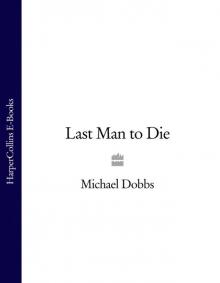 Last Man to Die
Last Man to Die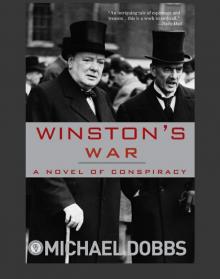 Winston's War
Winston's War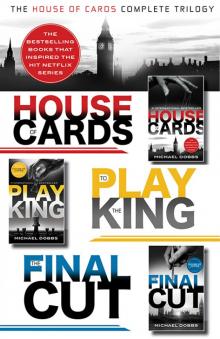 The House of Cards Complete Trilogy
The House of Cards Complete Trilogy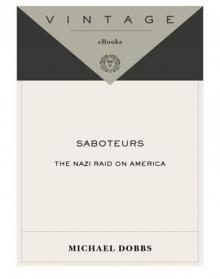 Saboteurs
Saboteurs The Touch of Innocents
The Touch of Innocents WC02 - Never Surrender
WC02 - Never Surrender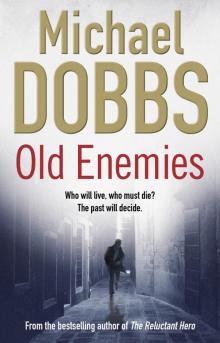 Old Enemies
Old Enemies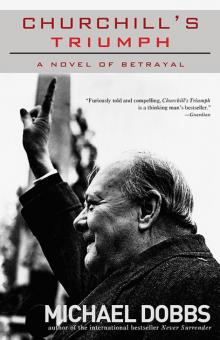 Churchill's Triumph
Churchill's Triumph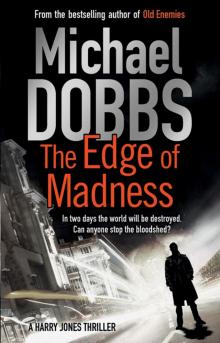 The Edge of Madness
The Edge of Madness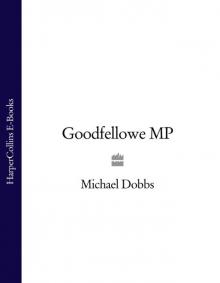 Goodfellowe MP
Goodfellowe MP The Final Cut
The Final Cut Whispers of Betrayal
Whispers of Betrayal Churchill's Hour
Churchill's Hour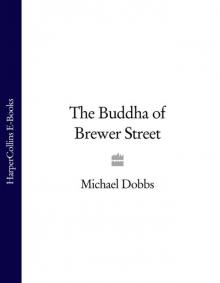 The Buddha of Brewer Street
The Buddha of Brewer Street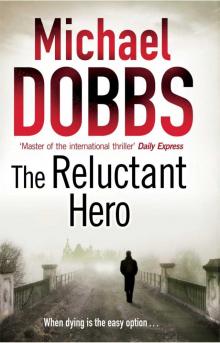 The Reluctant Hero
The Reluctant Hero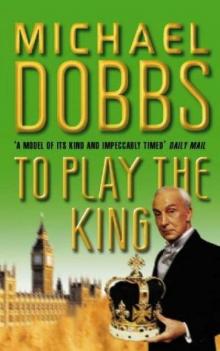 To Play the King
To Play the King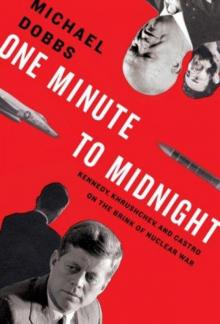 One minute to midnight
One minute to midnight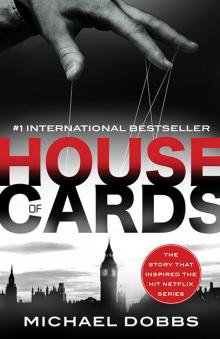 House of Cards
House of Cards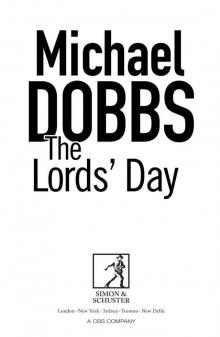 The Lords' Day (retail)
The Lords' Day (retail)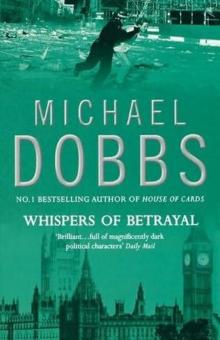 Whispers of betrayal tg-3
Whispers of betrayal tg-3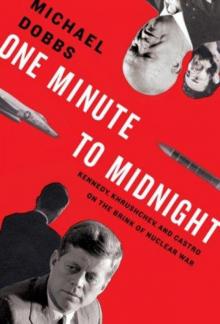 One minute to midnight: Kennedy, Khrushchev, and Castro on the brink of nuclear war
One minute to midnight: Kennedy, Khrushchev, and Castro on the brink of nuclear war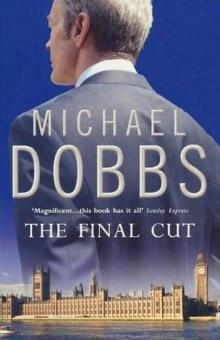 The Final Cut fu-3
The Final Cut fu-3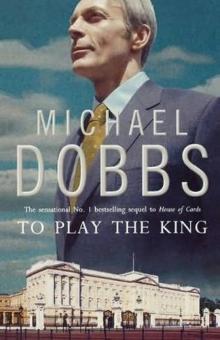 To play the king fu-2
To play the king fu-2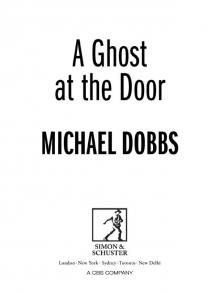 A Ghost at the Door
A Ghost at the Door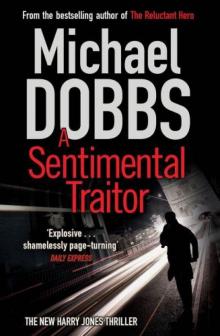 A Sentimental Traitor
A Sentimental Traitor